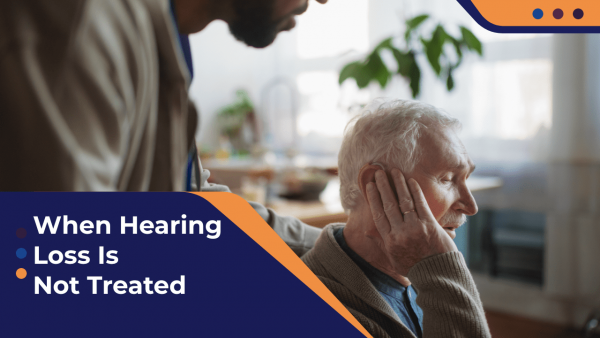What Happens When Hearing Loss Is Not Treated?

The onset of hearing loss is often insidious, meaning patients can be unaware of how impaired their hearing has become. This can lead to feelings of frustration not only for the sufferer, but also for other family members, friends, and work colleagues.
Hearing loss impacts many facets of life. Sufferers often find it hard to understand directions or instructions which can affect job performance or create embarrassment. There is a link to hearing loss and unemployment and on average, those with hearing loss earn significantly lower wages.
An inability to hear well may limit willingness to ask for help if the person affected is unable to clearly hear the response. This problem is exacerbated in noisy environments which can lead to additional frustration or withdrawal and a resulting lack of enjoyment in social settings such as restaurants or crowded situations.
Additional concentration is needed to focus on the spoken words, as well as reading lips. The use of masking during COVID made the ability to hear for this population even more difficult due to muffled voices and the inability to read lips.
Over time, the impact of hearing loss can lead to fatigue, tension, stress, and depression. Additional strain is placed on relationships stemming from frustration on both sides. The hearing impaired may speak loudly and get frustrated when others do not speak clearly and directly to them. They also need to hear other devices such as televisions at a high volume which can be disruptive for other family members.
Loneliness because of hearing loss is real. Sufferers can be inadvertently removed from conversations or purposely avoid conversation. Even though those affected may be surrounded by people, they suffer social isolation which can further lead to depression.
As hearing loss increases, the brain can become understimulated due to auditory deprivation while simultaneously creating fatigue and cognitive decline due to the added concentration needed when others are speaking. The risk of trips and falls are also higher as the patient becomes less aware of their surroundings.
Hearing loss is a normally expected result of aging, though it is one that can be managed. A link has been identified in those that experience hearing loss between the ages of 45 and 64 with a higher risk for dementia. They are also more likely to suffer injury from a fall or suffer from depression. Addressing the problem early can make a difference to these outcomes.
Treatment of hearing loss can mitigate many of these events by restoring confidence and the ability to hear. By addressing this problem earlier, there will be less impact on relationships and patients will benefit from better health as they age.
Physician practices can easily add audiology services to their practice and offer the convenience of testing and hearing aid services to their patients. Physician Hearing Network has an expanding network of locations across the US, offering hearing services where they should be, in physician practices. Contact us to find out more.










